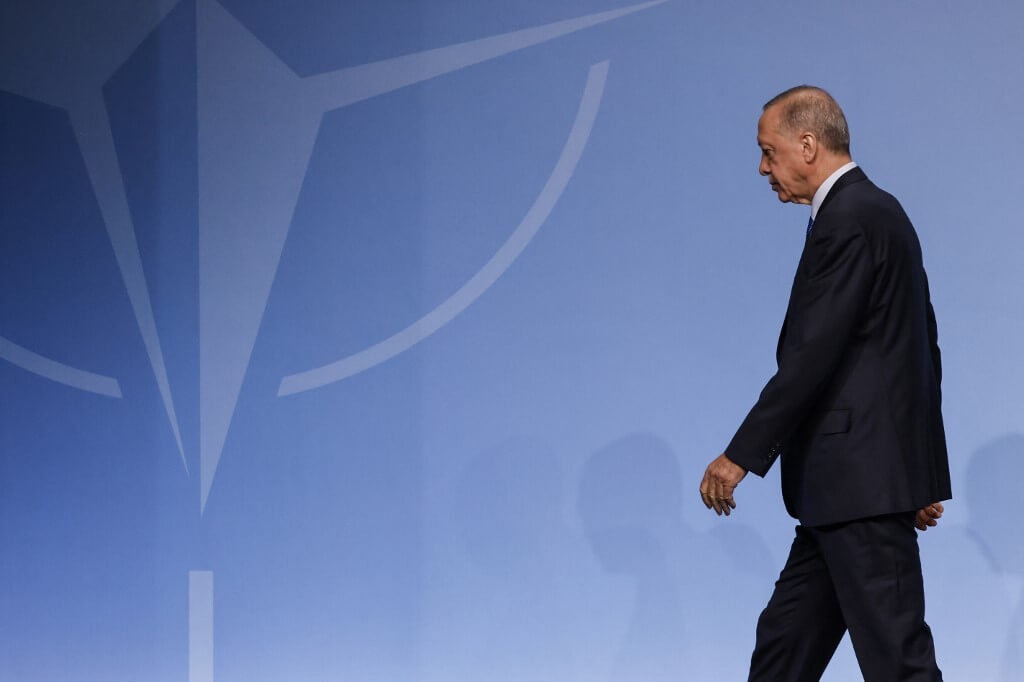Turkish President Recep Tayyip Erdoğan has performed one of his trademark policy U-turns on Sweden’s accession to NATO that culminates a gradual pro-Western tilt of course since his May re-election.
Erdoğan’s ended more than a year of wrangling and struck a deal Monday that will allow the Nordic nation to become the 32nd member of the US-led defense bloc.
It followed a dramatic day during which Erdoğan upped the stakes by suddenly demanding a clear path for Turkey’s long-stalled accession to the European Union in return.
The new ask secured him a private meeting with EU chief Charles Michel and a pledge from Sweden and NATO to “support efforts to reinvigorate Turkey’s EU accession process.”
The agreement allows NATO to stand more united at a two-day summit that started Tuesday in Vilnius with the aim of showing Western resolve in the face of Russia’s war on Ukraine.
But it also highlights a strategic shift in thinking that appears to have occurred in Ankara since Erdoğan nearly lost his two-decade grip on power in May elections.
The vote coincided with a dire economic crisis that Erdoğan tried to buffer through deals with rich Gulf countries and — to the West’s growing alarm — Russian President Vladimir Putin.
Erdoğan’s refusal to budge on Sweden added to the growing perception that NATO member Turkey was turning into a Kremlin tool for sowing divisions in the West.
That image began to change after Erdoğan turned to Wall Street-trained economists who want to improve relations with Western investors post-election.
He then hosted Ukrainian President Volodymyr Zelensky for more than two hours of talks Friday that created huge unease in Moscow.
The deal on Sweden followed a call with US President Joe Biden during which Erdoğan raised both EU accession and Turkey’s desire to acquire a large batch of F-16 fighter jets.
“Ankara wants to improve its relations with Europe and the West,” European Council of Foreign Relations analyst Aslı Aydıntaşbaş said.
“The recent policy balance had shifted too much towards Russia.”
‘Transactional style’
Erdoğan has long tried to leverage Turkey’s strategic location between Europe and Asia to play off Russian and Western interests for maximum gain.
Few expect his westward turn to represent a fundamental or long-term shift.
“We tend to think of Erdoğan as unpredictable. But that’s not entirely true,” said veteran Turkish analyst Salim Çevik.
“Once you understand his transactional style, he is quite predictable.”
Many note that Erdoğan’s change in tactics followed a June mutiny by Wagner mercenaries group leader Yevgeny Prigozhin that created mayhem in Moscow and suddenly left Putin looking weak.
Erdoğan ended his meeting with Zelensky by declaring support for Ukraine’s NATO ambitions and approving a deal under which Kyiv could get more Turkish combat drones.
But Russia’s most vocal anger came in response to five Ukrainian commanders that Zelensky brought back with him to Kyiv from Turkey.
The Avov regiment fighters became national heroes in Ukraine because of their last-stand defense of Mariupol — now seized by Russia — in the first months of war.
They were supposed to stay in Turkey until the war was over under a deal arranged with Erdoğan’s help in September 2022.
Kremlin spokesman Dmitry Peskov said Monday that Russia “expects to receive explanations from the Turkish side about what happened.”
“We will take this into account in our future agreements,” Peskov added.
‘Damaged goods’
Long-time Russia and Turkey watcher Timothy Ash partially links Erdoğan’s shift to the Wagner revolt.
“The Azov and drone deals over the weekend around the Zelensky visit showed that Turkey thinks, post the Prigozhin mutiny, that Ukraine will win and Putin is damaged goods and likely on his way out,” Ash said.
But Turkey’s membership in the European Union still looks like a distant prospect, and Erdoğan’s balancing act will likely continue for the final five years of his rule.
Erdoğan has scheduled a fundraising trip to Saudi Arabia and two other petro-dollar rich Gulf nations days after the NATO summit.
And European powers such as France have longstanding reservations about accepting Muslim-majority Turkey into the bloc.
The European Parliament voted to suspend negotiations with Ankara in 2019 because of what it viewed as Erdoğan’s backsliding on democratic values and human rights.
Turkey has been a formal candidate country since 2005.
“Turkey needs Western investments, but I don’t think they will come simply because the president has changed his rhetoric,” Turkey’s TEPAV policy institute analyst Nilgün Arısan Eralp said.
“They would like to see an economy based on the rule of law.”
© Agence France-Presse



